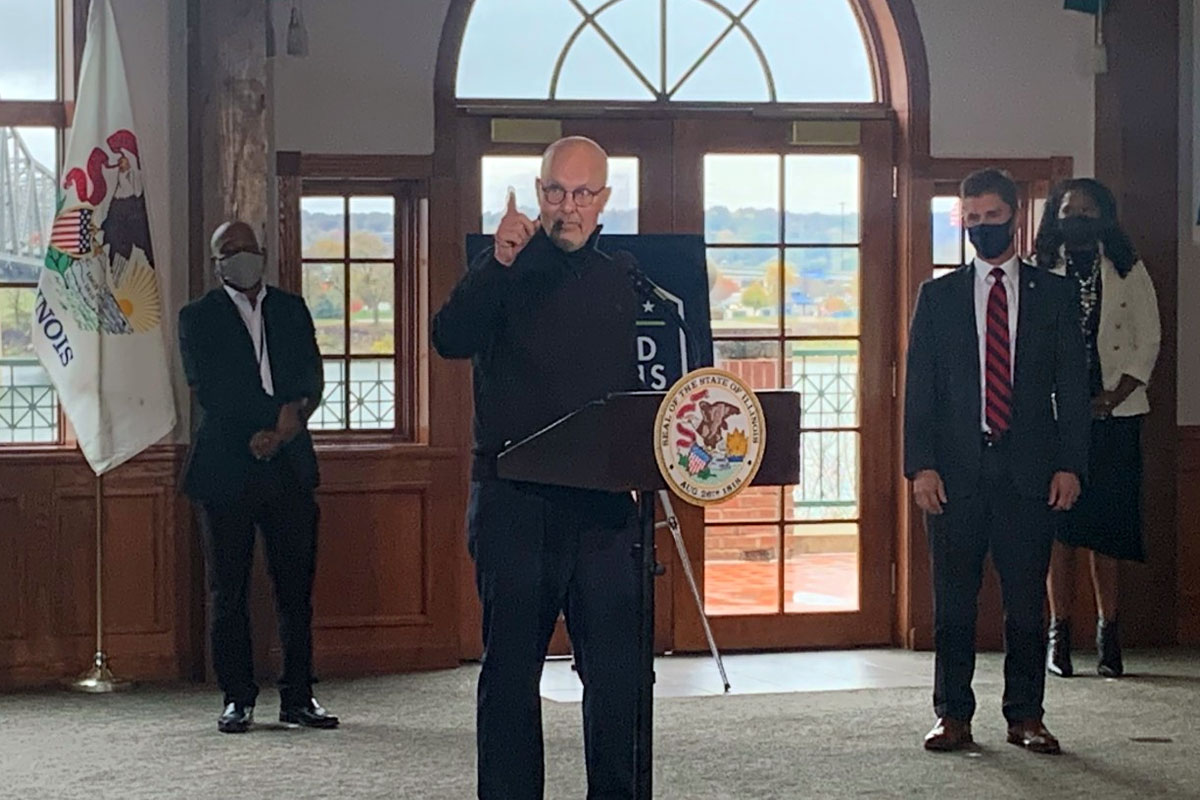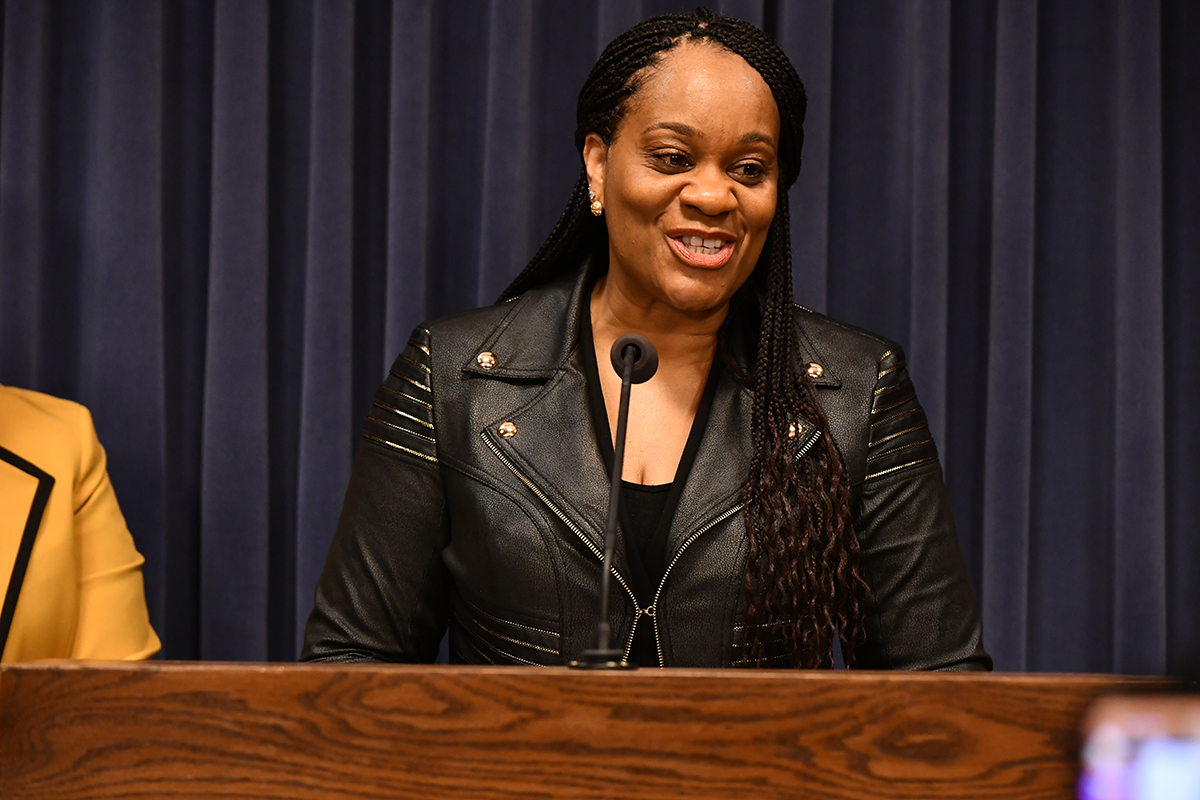- Details
- Category: Senator Scott Bennett News
 DANVILLE – With the holiday season fast approaching and the COVID-19 pandemic still ongoing, State Senator Scott Bennett (D-Champaign) is reminding residents to shop small and support local businesses whenever possible.
DANVILLE – With the holiday season fast approaching and the COVID-19 pandemic still ongoing, State Senator Scott Bennett (D-Champaign) is reminding residents to shop small and support local businesses whenever possible.
“Small businesses play a vital role in our economy, and it’s important that we promote and support them this holiday season,” Bennett said. “I encourage folks to think about the difference they can make in our community by supporting businesses where our friends and neighbors work.”
Read more: Bennett urges residents to shop local for the holiday season
- Details
- Category: Senator Steve Stadelman News

ROCKFORD – State Senator Steve Stadelman (D-Rockford) is pleased to report that the Illinois Department of Transportation announced Friday that I-39 resurfacing and two other major projects that will enhance safety while helping to grow the regional economy are wrapping up.
The projects represent a total investment of more than $55 million in the region.
“These projects helped create jobs and set the Rockford region up for economic opportunity for years to come,” Stadelman said. “Maintaining our roads and bridges is vitally important.”
Read more: Stadelman announces completion of I-39 and other major road projects
- Details
- Category: Senator Mattie Hunter News
 CHICAGO – The Illinois Department of Commerce and Economic Opportunity awarded business assistance grants last week, and State Senator Mattie Hunter (D-Chicago) is hopeful this will help local businesses in need of a financial boost.
CHICAGO – The Illinois Department of Commerce and Economic Opportunity awarded business assistance grants last week, and State Senator Mattie Hunter (D-Chicago) is hopeful this will help local businesses in need of a financial boost.
“It breaks my heart that business owners are still fighting this virus, physically and economically,” Hunter said. “I hope these grants provide some sort of relief. I will continue to advocate for financial support programs for businesses for as long as they are in need.”
Read more: Hunter announces area businesses will receive over $1 million in assistance
- Details
- Category: Senator Linda Holmes News

AURORA – Illinois Assistant Senate Majority Leader Linda Holmes (D-Aurora) is pleased to learn 19 businesses in the 42nd District are receiving financial assistance from the Business Interruption Grant program to help offset financial losses stemming from the ongoing COVID-19 pandemic. More funding is available, and Holmes is encouraging more businesses to apply.
“Small business owners have been some of the people hardest hit by the financial impacts of the COVID-19 pandemic,” Holmes said. “These grants will help them keep their doors open and their employees paid while keeping the community safe.”
In the district Holmes represents, 19 businesses are receiving a combined $1,155,000. Each business received between $5,000 and $150,000 to help cover the costs of payroll, rent, utilities and other working capital during the time they have experienced interruptions due to the pandemic.
- Details
- Category: Senator Patricia Van Pelt News

CHICAGO – To help businesses across the state overcome financial burdens brought on by the pandemic, State Senator Patricia Van Pelt (D-Chicago) is pleased to see dozens of businesses in the 5th District will receive over a million dollars in Business Interruption Grants (BIG).
“Businesses are still struggling as we continue to endure this pandemic,” Van Pelt said. “I hope these grants help give businesses on the West Side a boost, and for those who haven’t applied yet, it’s not too late.”
Last week, the Illinois Department of Commerce and Economic Opportunity (DCEO) awarded grants through the second round of the BIG program, which included specific funding for heavily impacted industries and businesses in disproportionately impacted areas. Each business received between $5,000 and $150,000 in financial assistance.
The BIG program is the largest state-run economic support program formed in response to the financial losses caused by the COVID-19 pandemic. Applications will remain open until all of the funding is spent and are available on DCEO’s website.
- Details
- Category: Majority Report
Bush: Together, we can stop the spread of COVID-19
GRAYSLAKE — Following the announcement that Region 9 – which makes up Lake and McHenry Counties – and most of the state has received increased COVID-19 restrictions, State Senator Melinda Bush (D-Grayslake) is reminding everyone the importance of the three Ws: wear a mask, wash your hands and watch your distance.
“Slowing the spread of COVID-19 is something we, as Illinoisans and Lake County residents, are familiar with and know how to do,” Bush said. “It’s important to continue our efforts to mask up, participate in common hygiene practices and not gather in large groups.”
Koehler highlights completion of Murray Baker Bridge
PEORIA — State Senator Dave Koehler (D-Peoria), joined with Gov. JB Pritzker and officials from the Illinois Department of Transportation to mark the completion of the Murray Baker Bridge’s renovation project last week.
“The revitalization of the Murray Baker Bridge is a long time coming," Koehler said. "The peace of mind that comes with regular maintenance of our roads and bridges cannot be understated and the newly installed lights add to the already magnificent Peoria skyline."
Rockford area small businesses receiving over $1 million in second round of pandemic relief
ROCKFORD — State Senator Steve Stadelman (D-Rockford) is highlighting the second round of Business Interruption Grants the Illinois Department of Commerce and Economic Opportunity is awarding to Rockford businesses and other small business communities that have been hit the hardest by COVID-19-related losses and closures.
“Small businesses are the lifeblood of my community,” Stadelman said. “They need this grant money to endure, and I’m happy the state continues to prioritize communities like Rockford in these hard times.”
Black Caucus committee Roundup for week of Oct. 26
SPRINGFIELD — To continue its work to combat systemic racism, the Illinois Legislative Black Caucus held a number of committees during the last week of October, covering topics from a lack of diversity in the workforce to disparities within the health care system.
The Senate held a joint hearing Monday to discuss the vast disparities Illinoisans face in access to treatment for addiction and mental health disorders.

In case you missed it
MEMBERS IN THE NEWS
Senator Scott Bennett, Champaign: New helpline serving farmers in six pilot counties | FarmWeekNow.com
Senator Jennifer Bertino-Tarrant, Plainfield: Grants still available for Will County businesses affected by COVID-19 restrictions | The Herald-News
Senator Laura Fine, Glenview: Fine generates support for local businesses during mitigations | Patch.com
Senator Elgie R. Sims, Chicago: Lawmakers discuss importance of police accountability, body cameras | WREX NBC 13
Copyright 2020 - Illinois Senate Democratic Caucus - All Rights Reserved
- Details
- Category: Senator Tom Cullerton News

VILLA PARK – State Senator Tom Cullerton (D-Villa Park) is pleased to announce businesses in the 23rd State Senate District will receive more than $400,000 in financial assistance from the Business Interruption Grant program to help offset financial losses stemming from the ongoing COVID-19 pandemic, and he is encouraging more to apply.
“Our local businesses are the foundation of our communities,” Cullerton said. “These funds will help our small businesses keep their doors open and employees and customers safe during this awful pandemic.”
Each business received between $5,000 and $150,000 to be used to help cover the costs of payroll, rent, utilities and other working capital during the time they have experienced interruptions due to the pandemic.
- Details
- Category: Senator Adriane Johnson News
 BUFFALO GROVE – To help small business owners dealing with the devastating financial impact of COVID-19, State Senator Adriane Johnson (D-Buffalo Grove) is pleased to learn nearly $900,000 has been awarded to businesses in the district she represents through the state’s Business Interruption Grant (BIG) program.
BUFFALO GROVE – To help small business owners dealing with the devastating financial impact of COVID-19, State Senator Adriane Johnson (D-Buffalo Grove) is pleased to learn nearly $900,000 has been awarded to businesses in the district she represents through the state’s Business Interruption Grant (BIG) program.
“Small business owners have faced continuous worries this year over whether they’ll have to shut their doors and how they’ll be able to support their families,” Johnson said. “Money awarded through these grants will help them be able to continue to bolster our communities through their products and services.”
Read more: Johnson: Nearly $900,000 awarded to small businesses in 30th District
More Articles …
- McGuire urges COVID-19 cooperation, offers economic assistance and unemployment insurance guides
- Martinez: 32 local businesses awarded state funds, and more can apply
- Steans: 51 businesses in 7th District received $1.8M in pandemic help, applications still open
- Senator Fine announces $415K in BIG grants to local businesses, encourages others to apply
Page 606 of 768

















 © 2026 Illinois Senate Democratic Caucus
© 2026 Illinois Senate Democratic Caucus